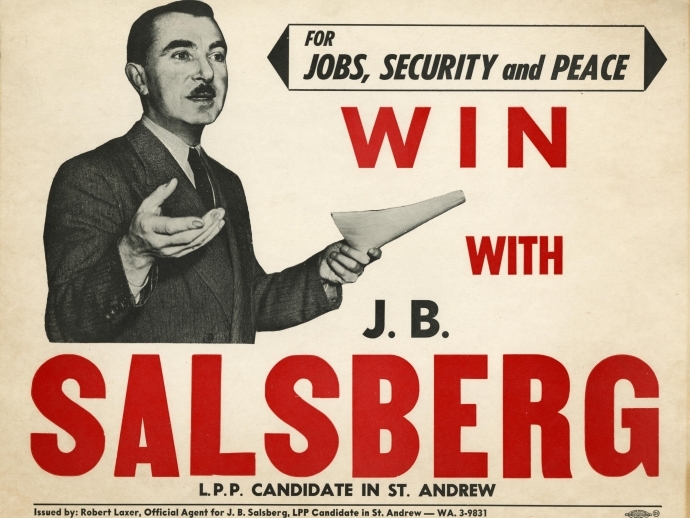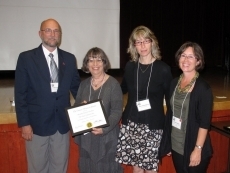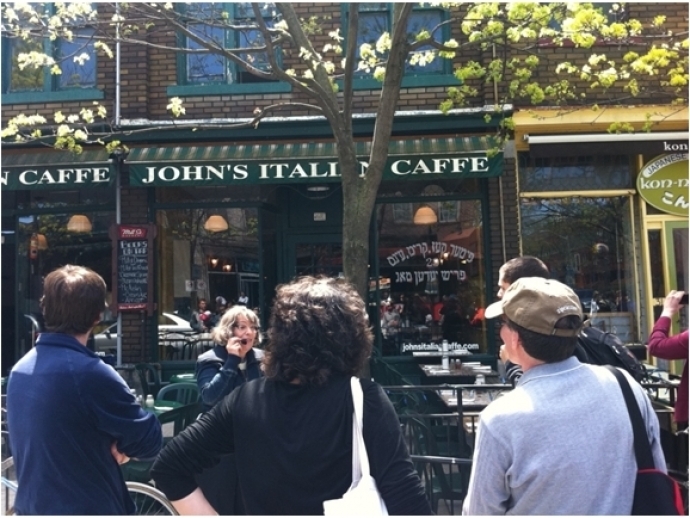Provincial political history at the OJA
The OJA has recently processed the records of Joseph Baruch (J.B.) Salsberg (1902-1998), a prominent labour leader, political activist, politician, and journalist. Salsberg was also active in various Jewish organizations, including the Canadian Jewish Congress (CJC), the UJA Federation of Greater Toronto, and the New Fraternal Jewish Association. He is well remembered by contemporaries, such as Sam Lipshitz, as a "champion of the people", committed to social justice, the plight of the working-class, and the preservation of Jewish culture.
J.B. was born in Lagov, Poland on November 5, 1902 to Abraham and Sarah-Gittel Salsberg. In 1913, he immigrated to Toronto with his mother and two younger sisters, following his father's arrival three years earlier. Four additional siblings were born in Canada. J.B. briefely attended Landsdowne Public School, but dropped out at age 13, against his parent’s wishes, and took a job in a leather goods factory in order to contribute to his family’s income. His parents had hopes that he would become a rabbi and, despite his full-time employment, J.B. continued to study the Torah at the Centre Ave Synagogue.
In 1917, J.B. decided to pursue the ideas of Zionism and Socialism and abandoned his plans to become a rabbi. He became involved in establishing the Young Poale Zion organization, a Labour Zionist youth group dedicated to secular aims. Around 1923, he became the organizer for the Hat, Cap, and Millinery Workers Union of North America in Chicago. While in Chicago, J.B. married Dora Wilensky, who would become his constant companion and supporter, and a well-respected communal worker in her own right.
In 1926, J.B. joined the Communist Party of Canada (CPC). He was an active member of the CPC for 30 years, serving as the head of its Trade Union Department for two decades. It was as a member of the CPC that he entered electoral politics. After a series of failed bids in municipal and provincial elections between 1935 and 1937, J.B. was elected Alderman of Ward 4 in Toronto in 1938, but only held the position for one year. In 1943, he was elected to the Ontario Legislature as the representative for the St. Andrew riding. He sat as Member of Provincial Parliament for the Labour-Progressive Party (the provincial wing of the CPC) for 12 years. For several years, he was the only elected communist in North America. As MPP, he helped create legislation banning discrimination in public places and introduced a bill that would ensure fair employment practices in the province. He lost his seat to Allan Grossman in 1955 and unsuccessfully ran in the federal election later that year. Remembered by journalist Gordon Sinclair as "one of the best debaters in the house", J.B. was well-respected by members of all political parties. Out of admiration for J.B., Conservative Premier Leslie Frost named Salsberg Township in Northern Ontario in his honour.
Throughout the 1930s and 1940s, J.B. had grown increasingly concerned about reports of Soviet anti-Semitism and privately urged party leaders to pursue the issue. In 1956, when Soviet First Secretary Nikita Khrushchev exposed the transgressions of Stalin’s regime, J.B. went to Moscow as part of a CPC delegation. After meeting with Khrushchev himself, it became clear to J.B. that anti-Semitism was indeed a serious threat in the USSR and that his efforts to probe the situation were being stonewalled. J.B. publicly expressed his concerns in a series of articles published in the Vochenblatt between October 25 and December 13, 1956. He formally renounced his membership in the Communist Party in 1957. Two years later, J.B., along with others of like mind, resigned their membership in the United Jewish People’s Order (UJPO), a communist Jewish fraternal organization, for not being critical enough of the Soviet Union. A non-communist left-wing Jewish organization was founded as an alternative - the New Fraternal Jewish Association - of which J.B. served as President for several terms and edited its publication "Fraternally Yours".
In his later life, J.B. was active as an executive member of organizations such as the CJC and the Baycrest Centre for Geriatric Care. He was the first chairman for the CJC Ontario Region’s Soviet Jewry Committee and the Committee for Yiddish. He also began writing an award-winning weekly column for the Canadian Jewish News. J.B. was awarded the CJC’s Samuel Bronfman Medal for distinguished service, and the UJA Federation of Greater Toronto’s Ben Sadowski Award of Merit. A strong supporter of Israel, he was involved in the creation of two Israeli medical centres that are named in his honour. He also helped establish the J.B. and Dora Salsberg Fund and the J.B. Salsberg Fund for Yiddish at the Jewish Foundation of Greater Toronto. J.B. passed away in 1998.
The records in this collection document J.B.'s political and communal activities and includes personal and professional correspondence, photographs, political and editorial writings, artifacts and campaign materials. The records will be of great value to researchers interested in provincial politics, labour history, and the history of communism within the Jewish community of Toronto.




